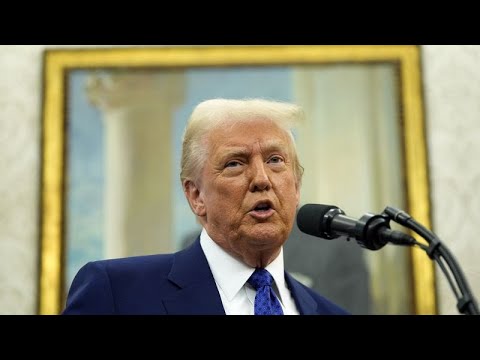Trump Upends US Policy on Ukraine, Announces Agreement with Putin to Begin Talks on Ending the War
In a dramatic shift from current US foreign policy, former President Donald Trump has announced that he and Russian President Vladimir Putin have agreed to initiate direct talks aimed at bringing an end to the ongoing conflict in Ukraine. The move marks a significant departure from the Biden administration’s approach, which has centered on continued military aid and sanctions against Russia in support of Ukraine’s sovereignty.
Speaking at a press conference earlier today, Trump revealed that he had been in private discussions with Putin for several months and that they had come to an understanding on the necessity of dialogue to resolve the war. “We have agreed that it’s time to bring this terrible conflict to an end. The bloodshed, the destruction—it’s got to stop. It’s time to talk,” Trump declared. He emphasized that the negotiations would be aimed at achieving a peaceful settlement that respects both Ukraine’s territorial integrity and Russia’s security concerns.
Trump’s remarks have sent shockwaves through Washington, with political analysts and lawmakers scrambling to assess the implications of such an unprecedented move. While some have praised the former president for his bold stance, others have expressed concerns that this could be a risky gambit that undermines Ukraine’s position and emboldens Russia.
A Break from Tradition
Trump’s announcement marks a break from traditional US policy on Ukraine. Since Russia’s invasion of Ukraine in February 2022, the United States, under President Joe Biden, has provided significant military and economic support to Ukraine. The US has sent billions of dollars in aid, including advanced weaponry, to help Ukraine defend itself against Russian aggression. Additionally, the Biden administration has imposed a wide range of sanctions on Russia, aiming to weaken its economy and isolate it diplomatically on the world stage.
However, Trump has long criticized the Biden administration’s approach, calling it too aggressive and accusing the US of becoming too involved in a foreign conflict. In his press conference, he argued that US involvement in Ukraine has only escalated tensions and prolonged the war. “The US is sending billions, but it’s not helping Ukraine win. It’s dragging the rest of us into a disaster,” Trump said. “I’m the only one who can bring both sides to the table.”
Trump’s skepticism of the current strategy is consistent with his “America First” foreign policy, which sought to minimize US entanglement in overseas conflicts. During his presidency, Trump took a more isolationist approach, advocating for fewer military interventions and emphasizing bilateral negotiations.
The Role of Putin
Trump’s announcement that he and Putin had reached an agreement to begin talks is particularly controversial, given the ongoing hostilities between Russia and Ukraine. Since the invasion began, Putin has remained defiant, rejecting international pressure to withdraw Russian forces from Ukrainian territory. The Kremlin has insisted that its actions are necessary for the protection of Russian-speaking populations in Ukraine and for Russia’s national security.
Trump’s assertion that he and Putin have found common ground could signal a change in Moscow’s position, although details of what was agreed upon remain unclear. The former president did not specify whether Putin had agreed to a ceasefire or what terms would be discussed during the upcoming talks. However, he emphasized that the conversations would be aimed at “securing peace and stability for Europe.”
Some analysts believe that Trump’s personal rapport with Putin could be a key factor in facilitating negotiations. Trump and Putin have often expressed mutual respect for one another, with the former president being one of the few Western leaders to openly praise the Russian president. In contrast, Biden and other NATO leaders have been openly critical of Putin, particularly after the annexation of Crimea in 2014 and the subsequent invasion of Ukraine.
Reactions from Washington
The response to Trump’s announcement has been swift and polarized. Some Republican lawmakers have rallied behind Trump’s call for peace, arguing that the US should prioritize diplomatic efforts over military involvement. “We need a leader who will stand up to both Putin and the establishment in Washington. Trump is the man who can bring this war to a close,” said Senator Lindsey Graham, a long-time ally of Trump.
On the other hand, many Democrats have voiced concerns that Trump’s plan could undermine Ukraine’s efforts and legitimize Russia’s aggressive actions. “This is a dangerous move that could embolden Putin and send the wrong message to the world,” said Senator Dick Durbin. “Ukraine has the right to defend itself, and we must continue to stand with them.”
International reactions to Trump’s proposal have been mixed. While some European leaders have expressed cautious optimism that peace talks could lead to a resolution, others remain skeptical of Russia’s willingness to negotiate in good faith.
The Path Ahead
While the details of Trump’s proposal remain unclear, one thing is certain: the war in Ukraine is far from over, and the prospect of peace talks brings with it both hope and uncertainty. As the world watches closely, the question remains whether Trump’s unconventional approach to diplomacy can truly bring an end to the bloodshed, or whether it risks further complicating an already volatile situation.
For now, the US and the world wait for the next steps in this developing story. Will Trump’s intervention serve as a catalyst for peace, or will it fuel more division and conflict? Only time will tell.
credit: euronew

